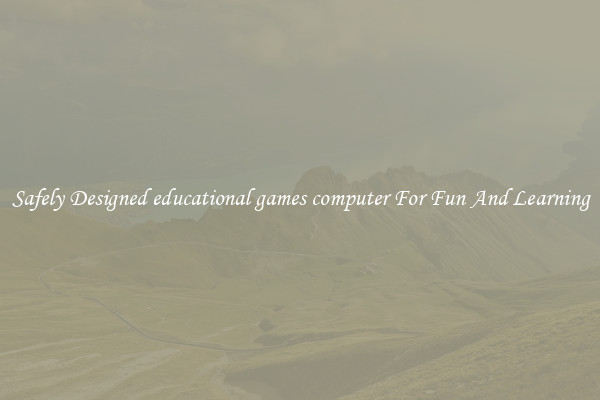Safely Designed educational games computer For Fun And Learning
In today's digital age, it is no surprise that educational games are becoming increasingly popular among students. These games offer a unique combination of fun and learning, making them an effective tool for both educators and parents. However, with the rise in popularity of educational games, it is crucial to ensure that they are safely designed to protect children online.

One of the main advantages of educational games is their ability to engage and motivate students. Unlike traditional teaching methods, these games incorporate interactive elements which make learning more enjoyable. By presenting information in a gamified format, students are more likely to retain knowledge and develop crucial skills such as problem-solving, critical thinking, and creativity.
While educational games offer numerous benefits, it is essential to prioritize the safety of children when designing these games. Developers must take into consideration factors such as data privacy, age-appropriate content, and prevention of cyberbullying. Educational games should have strict guidelines in place to ensure that any information collected from users is safeguarded and not misused or shared with third parties.
Age-appropriate content is another critical aspect of safely designed educational games. Developers must ensure that the games are tailored to suit the age range of the intended audience. Content should be educational, unbiased, and promote positive values. By adhering to these guidelines, children will have access to quality educational games that cater to their specific developmental needs.
Cyberbullying is a growing concern in the digital world, and educational games can provide a safe haven for children. Developers should implement robust measures to prevent cyberbullying within the game environment. This can include features such as real-time moderation or a reporting system that allows users to flag inappropriate behavior. By actively addressing and discouraging cyberbullying, educational games can foster a safe and inclusive learning environment for all students.
Additionally, parental involvement and control are crucial when it comes to educational games. Developers should provide features that allow parents to monitor their child's progress, set time limits, and restrict access to certain content. This level of transparency and control ensures that parents can actively participate in their child's online learning experience while maintaining a safe and healthy balance between screen time and other activities.
In conclusion, educational games are a fantastic tool for both fun and learning. They offer a unique and engaging way for students to acquire knowledge and develop important skills. However, it is essential that these games are safely designed to protect children online. Ensuring data privacy, age-appropriate content, prevention of cyberbullying, and providing parental involvement are key factors in creating a safe and enriching educational gaming experience. By prioritizing safety, educational games can continue to make a positive impact on children's education and overall development.

View details

View details

View details

View details








